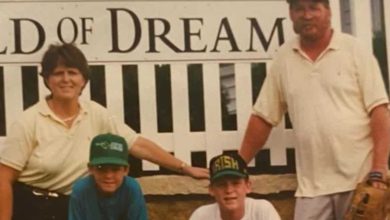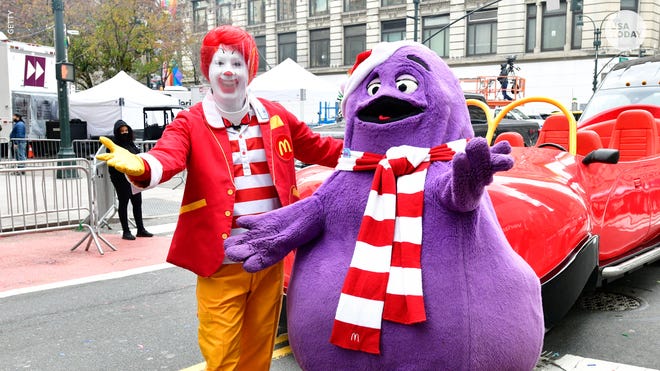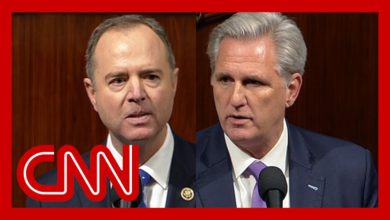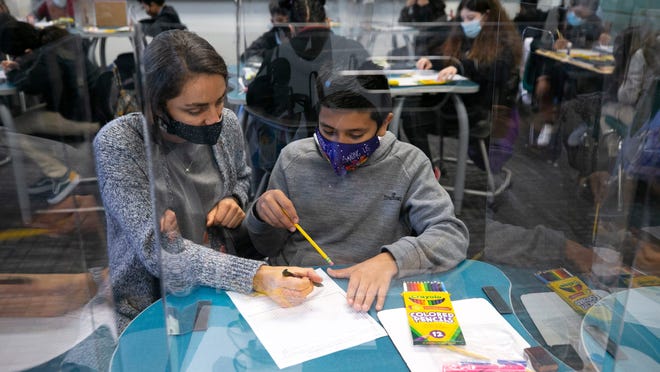NEW YORK – Suddenly, it was 20 years.
Once again the living victims of the 9/11 attacks – the walking wounded who lost friends and relatives or survived and now wonder why – came back to the place we once called ground zero. They grieved on a morning eerily similar to that Tuesday in 2001 — a cloudless blue sky filled Lower Manhattan with bright light and the cool of the fall to come.
This year was different, though.
Yes, the bagpipers played “Amazing Grace.” Children who were not born on that bloody day read names of uncles and aunts they never met. Firefighters pinged a silver bell to mark the precise times when planes crashed and skyscrapers fell and smoke smudged a perfect azure sky.
But the pain seemed deeper now.
Trying to measure sorrow is never easy. Was the first 9/11 anniversary, with mourners laying flowers in a construction pit worse than the fifth? Or the 10th? Or the 15th?
But 20 years is a benchmark. A generation has been born since the 9/11 attacks. Five presidential elections have taken place. America has fought its longest war. It now battles its worst pandemic in more than a century and faces a sense that our people are more disunited and hateful of each other than any other time since the Civil War.
Twenty years ago, Greg Packer, then a highway maintenance worker from Huntington, Long Island, rushed to the smoldering ruins of the World Trade Center in Lower Manhattan. His goal: Help anyway he could.

He found himself passing out water and meals to firefighters, police and construction workers who scrambled over the twisted steel and crumbled concrete, trying to find survivors or recover bodies.
What Packer found was a sense of unity that he had never felt before in his nation.
“It’s 20 years later and I need to be here to remember and never forget,” Packer said Saturday as he stood on Greenwich Street, a block from the 9/11 Memorial Plaza and its majestic oak trees and soothing waterfalls and names of the dead.
Remembering also makes Packer sad.
“We’re dealing with mass shootings,” he said. “We’re dealing with a pandemic, and people are not getting along.”
More:On the 20th anniversary of 9/11, America honors the memory of those who were lost: 'We remember'
Facing disunity
The sense of disunity – and its shocking contrast to the united spirit of America in the weeks after the 9/11 attacks – was a theme of Saturday’s memorials.
Speaking at the memorial in Shanksville, Pennsylvania, where passengers forced a hijacked plane bound for the U.S. Capitol to crash into a farm field, Vice President Kamala Harris called on Americans to come together.
“If we do the hard work of working together as Americans, if we remain united in purpose, we will be prepared for whatever comes next,” she said.
On Friday night, President Joe Biden made a similar plea for unity. Also speaking in Shanksville, former President George W. Bush said he “was proud to lead an amazing, resilient, united people” in the wake of the 9/11 attacks.
Now, he sees a far different political landscape.
“When it comes to the unity of America,” Bush said, ”those days seem distant from our own."
Former Presidents Barack Obama and Bill Clinton stood with Biden at the service in Manhattan. Biden then made stops in Shanksville and at the Pentagon.

Former President Donald Trump did not join former presidents at any of the 9/11 commemorations.
Tears brimmed in the eyes of Tony-winning Broadway actress Kelli O’Hara as she sang an emotional rendition of “You’ll Never Walk Alone” between readings of name of the dead at the 9/11 Memorial Plaza in lower Manhattan. Moments before, Bruce Springsteen seemed to choke slightly as he began his own anthem of sorrow and death, “I”ll See You In My Dreams.”
In the crowd of several thousand mourners, Patrick Smith of Jersey City removed his newsie’s cap as he listened to Springsteen.
Smith lost his brother, Tom, when the World Trade Center’s South Tower fell. He’s now 52, still a tough iron worker.
But on Saturday, wearing a blue T-shirt with his brother’s name and the slogan, “we will never forget,” tears rolled down his cheeks as he remembered his brother, a budding executive with Morgan Stanley who worked on the 70th floor of the South Tower.
Tom Smith’s colleagues escaped by taking the stairs. Smith jumped on an elevator and was never seen again.
“My brother knew every word of every Springsteen song,” Patrick Smith said as he wrapped his right arm around the shoulder of his wife, Evonne.
The couple silently took in Springsteen’s lyrics:
"I'll see you in my dreams.
We’ll meet and live and love again.
I’ll see you in my dreams.
Yeah, up around the river bend.
For death is not the end.”
As Springsteen finished, Patrick looked up to heaven and smiled.
Patrick’s nephew, Peter, read names of the dead from the stage next to the spot where Springsteen played. As he finished with his list of the dead, Peter, who wasn’t born when the 9/11 attacks took place, mentioned Tom Smith, adding, “I can’t wait to meet you.”
“There is a God,” Patrick said.
The pain returns
Such were the small moments of comfort. Perhaps it was just a humorous remembrance as a relative read names. Perhaps it was a handmade sign with family photographs carried by the elderly father of Danielle Kousoulis, a vice president at the Cantor Fitzgerald investment firm who perished when the North Tower fell. Or perhaps it was the sign and T-shirt carried by the mother of George Cain, a fire fighter who died trying to rescue officers workers at the Trade Center.
“These 20 years have felt like both a long time and a short time,” said Mike Low as he remembered his daughter, Sara Elizabeth, a flight attendant who died when American Airlines Flight 111 crashed into the North Tower. “As we recite the names of those we lost my memory goes back to that terrible day when it felt alike an evil specter descended on our world but it was also a time when many people acted above and beyond the ordinary.”
As he walked the streets near the Memorial Plaza, Tony Hammond, 66, of Louisville, Kentucky, thought of how the pain of 9/11 had actually become something of a unifying balm for some.
“They talk about six degrees of separation,” said Hammond, who came to the memorial for the first time. “But I don’t think there is that much separation for the people who come to this event.”
For a day at least, America caught a glimpse of how 9/11 brought us together.
But like all the other anniversaries of the nation’s deadliest terrorist attack, that pain also hurt deeply.
Cliff Schlosser, now 57 and a battalion chief for the Rahway, New Jersey, fire department, rushed to the world trade center only hours after the attacks. Then he kept going back, working 12-hour shifts to help recover the dead.
He came back on Saturday — just as he always has in previous years.
And the old pain returned.
“It’s the same,” he said. “It doesn’t get easier.”
Mike Kelly is an award-winning columnist for NorthJersey.com, part of USA TODAY Network. Contact Kelly on Twitter at @mikekellycolumn.









